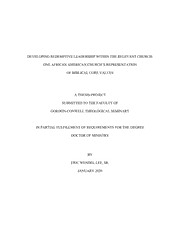
Developing Redemptive Leadership Within the Relevant Church PDF
Preview Developing Redemptive Leadership Within the Relevant Church
DEVELOPING REDEMPTIVE LEADERSHIP WITHIN THE RELEVANT CHURCH: ONE AFRICAN AMERICAN CHURCH’S REPRESENTATION OF BIBLICAL CORE VALUES A THESIS-PROJECT SUBMITTED TO THE FACULTY OF GORDON-CONWELL THEOLOGICAL SEMINARY IN PARTIAL FULFILLMENT OF REQUIREMENTS FOR THE DEGREE DOCTOR OF MINISTRY BY ERIC WENDEL LEE, SR. JANUARY 2020 Copyright © 2020 by Eric W. Lee. All Rights Reserved. To my loving wife and chief editor: thank you for facilitating our family and every milestone moment in my life and ministry. Lift every voice and sing Till earth and heaven ring Ring with the harmonies of Liberty; let our rejoicing rise, high as the list'ning skies, let it resound loud as the rolling sea sing a song full of faith that the dark past has taught us, sing a song full of the hope that the present has brought us; facing the rising sun of our new day begun, let us march on till victory is won. —James Weldon Johnson, The African American National Anthem CONTENTS ACKNOWLEDGMENTS ...................................................................................................... vii GLOSSARY .......................................................................................................................... viii ABSTRACT ............................................................................................................................. ix Chapter 1. THE PROBLEM AND ITS SETTING ................................................................... 1 2. BIBLICAL AND THEOLOGICAL FOUNDATIONS ........................................ 23 3. LITERATURE REVIEW ..................................................................................... 46 4. PROJECT DESIGN .............................................................................................. 65 5. OUTCOMES AND CONCLUSIONS .................................................................. 88 Appendix A. CORE VALUES BEST PRACTICES INTERVIEW QUESTIONS ................ 108 B. CORE VALUES BEST PRACTICES INTERVIEWS ..................................... 111 C. PASTORAL SURVEY QUESTIONS ............................................................... 120 D. PASTORAL SURVEY RESPONSES ............................................................... 126 E. SPRINGFIELD POST-SEMINAR EVALUATION QUESTIONNAIRE WITH RESPONSES .......................................................................................... 170 F. SEMINAR ONE PRESENTATION: WHY THE CHURCH? ........................... 190 G. SEMINAR TWO PRESENTATION: WORSHIP & FELLOWSHIP PILLARS .................................................................................. 193 H. SEMINAR THREE PRESENTATION: CHRISTIAN EDUCATION PILLAR 197 I. SEMINAR FOUR PRESENTATION: EVANGELISM & STEWARDSHIP PILLARS ............................................................................................................ 201 v J. SEMINAR FIVE PRESENTATION: THE SERVICE PILLAR ......................... 205 K. SEMINAR SIX PRESENTATION: WHAT IS THIS CHURCH? .................... 208 BIBLIOGRAPHY ................................................................................................................. 212 VITA ..................................................................................................................................... 220 vi ACKNOWLEDGMENTS To my brilliant, beautiful and gifted children, I pray that you will forever consider the centrality of Christ and His church in our past, present and future. To my parents, thanks for the foundation. To the Springfield Baptist Church, thank you for your love, support and patience for the past two decades. vii GLOSSARY African American Church - This term will refer to historical churches and new church plants that minister largely to African Americans and Caribbean Americans whose socioeconomic context is characterized by the categorical discrepancies outlined in chapter one of this thesis-project. This definition is inclusive of any church with a diverse congregation and leadership. Redemptive Expression - Redemption is derived from a Latin root meaning “to buy back,” thus meaning the liberation of any possession, object, or person, usually by payment of a ransom. In Hebrew the root word is padah or “to substitute”. In Greek the root word means “to loose” and so “to free”. Derived from a history of enslavement and exile, the Hebrew Bible is replete with messianic expectation for national redemption. Redemption is not merely eschatological but the restoration of intrinsic value and worth from socioeconomic and political oppression or personal depravity. Religious Experience - A spiritual encounter or experience where an individual or a group is confronted with divine truth, be it through liturgy, worship, preaching, Bible study, miracles or other natural and supernatural phenomenon. Examples: 1) Genesis 32:24-32 The patriarch Jacob wrestled with God all night. 2) Luke 4:14-21 Jesus declares that the prophetic expectation of Isaiah has been fulfilled by his messianic presence. 3) Acts 2:1-7 The Day of Pentecost gives way to the birth of the Church accomplished by the visitation of the Holy Spirit. viii ABSTRACT This thesis-project will craft a church leadership methodology that empowers the contemporary African American church to be the zeitgeist of redemptive expression within its community. Henceforth, a reclamation of the biblical core values that subsequently enabled the African American church to be the “cultural womb” of its community is required. To retain and enhance this cultural influence, leadership must align biblical beliefs, core values and redemptive practices as recorded in Acts 2. The corresponding curriculum is for contemporary African American church leadership and seeks to achieve a more biblically rooted and socially relevant church beyond the post-modern age. ix CHAPTER ONE THE PROBLEM AND ITS SETTING Introduction “What difference does the church make?” When I was younger, my peers would often ask this question with regard to my upbringing in the church. They were not intentionally being irreverent. But as church “nones and dones” or church outsiders they asked a basic question that every church insider should be capable of answering, “What difference does it make?”1 Today, it is more important than ever that church leadership, in the face of expansive secularization, be intentional about developing a church that makes a tangible difference in the qualitative welfare of its community. The questions and assertions raised by C. Eric Lincoln and Lawrence Mamiya’s The Black Church in African American Experience require our theological and ecclesiastical consideration. The authors assert that “the complexities of black churches as social institutions require a more dynamic and interactional theoretical perspective because they have played more complex roles and assumed more comprehensive burdens in their communities than is true of most white and ethnic churches.”2 By historical necessity, the African American church has been the zeitgeist of social influence since the 18th century, through the antebellum period of American history, to the civil rights era, and until this very day. Today, the myth of a post racial America has emerged due to progress in African American civil rights, in education, in wealth 1. Ronnie McBrayer, “Nones and Dones,” RonnieMcBrayer.org, February 20, 2017, accessed August 25, 2019, https://ronniemcbrayer.org/2017/02/20/nones-and-dones/. 2. C. Eric Lincoln and Lawrence H. Mamiya, The Black Church in the African American Experience (Durham: Duke University Press, 1990), 18. 1
